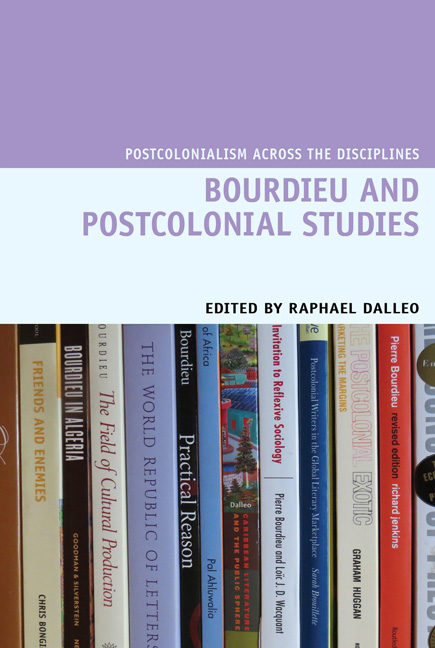Book contents
- Frontmatter
- Contents
- Permissions
- Introduction
- 1 Writing at the Margins: Postcolonialism, Exoticism and the Politics of Cultural Value (from The Postcolonial Exotic)
- 2 Exiles on Main Stream: Valuing the Popularity of Postcolonial Literature (from Friends and Enemies)
- 3 Postcolonial Authorship Revisited (from Postcolonial Writers in the Global Literary Marketplace)
- 4 Bourdieu and Fanon on Algeria
- 5 Style as Habitus: World Literature, Decolonization and Caribbean Voices
- 6 Playing the Game? The Publication of Oswald Mtshali
- 7 Fields in Formation: English Studies and National Literature in South Africa (with a Brazilian Comparison)
- 8 Archived Relationships: Pierre Bourdieu and Writers of the Caribbean Diaspora
- 9 Irony in the Dungeon: Anamnesis and Emancipation
- About the Contributors
- Index
2 - Exiles on Main Stream: Valuing the Popularity of Postcolonial Literature (from Friends and Enemies)
- Frontmatter
- Contents
- Permissions
- Introduction
- 1 Writing at the Margins: Postcolonialism, Exoticism and the Politics of Cultural Value (from The Postcolonial Exotic)
- 2 Exiles on Main Stream: Valuing the Popularity of Postcolonial Literature (from Friends and Enemies)
- 3 Postcolonial Authorship Revisited (from Postcolonial Writers in the Global Literary Marketplace)
- 4 Bourdieu and Fanon on Algeria
- 5 Style as Habitus: World Literature, Decolonization and Caribbean Voices
- 6 Playing the Game? The Publication of Oswald Mtshali
- 7 Fields in Formation: English Studies and National Literature in South Africa (with a Brazilian Comparison)
- 8 Archived Relationships: Pierre Bourdieu and Writers of the Caribbean Diaspora
- 9 Irony in the Dungeon: Anamnesis and Emancipation
- About the Contributors
- Index
Summary
Put me in a room with a great writer, I grovel. Put me in with Roseanne, I throw up.
(Jamaica Kincaid)Introduction: Laying Down the Postcolonial Law
When editor Tina Brown asked media icon Roseanne to serve as guest consultant for a special women's issue of The New Yorker in 1995, Antiguan-American novelist Jamaica Kincaid's reaction was one of righteous outrage. She trashed Brown's protégé in the most emphatic of terms—as my epigraph demonstrates—and promptly severed her decades-long ties with The New Yorker, accusing Brown of transforming that once venerable journal into ‘a version of People magazine.’ Kincaid's open hostility represents something more than an individual fit of pique on the part of a notoriously irascible and opinionated writer. Rather, her nausea at the thought of being forced to occupy the same physical and textual space as Roseanne has much to tell us about the vexed, and under-theorized, relations between postcolonial cultural producers (be they creative writers or academic theorists) and what is still often condescendingly referred to as mass culture. Kincaid's testy comments direct us toward the surprisingly uncharted territory in which postcolonial and cultural studies (don't yet) meet.
The one-sided confrontation between Kincaid and Roseanne can be read as emblematic of a failed dialogue between postcolonial and cultural studies. In Kincaid, we have a respected author of such postcolonial (or Afro-diasporic) ‘classics’ as Annie John and A Small Place, someone frequently lionized by critics as a writer who ‘speaks to and from the position of the other’ (Ferguson 1993, 238). In Roseanne, we have a US television star who has also accumulated her own fair share of academic plaudits from critics in disciplines such as women's and cultural studies, who have lauded ‘her subversive potential as a source of resistance and inspiration for feminist change’ (Lee 1992, 96) or the way her show (which ran from 1988 to 1997) ‘potentially helps restore class visibility to the overwhelmingly middle-class world of television’ (Bettie 1995, 142). While Roseanne may never have read Kincaid, the postcolonial author obviously feels that she has ingested enough of the comedian's work to pass definitive judgment on the guiltily degraded form of culture this media icon embodies: only those with ‘coarse and vulgar’ taste, like Tina Brown, could possibly be drawn to such a nauseating figure as Roseanne.
- Type
- Chapter
- Information
- Bourdieu and Postcolonial Studies , pp. 53 - 79Publisher: Liverpool University PressPrint publication year: 2016



